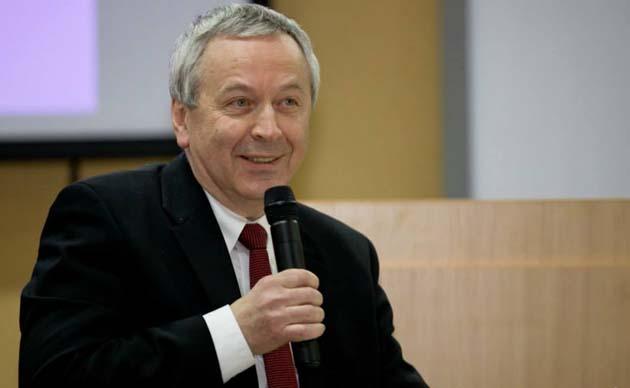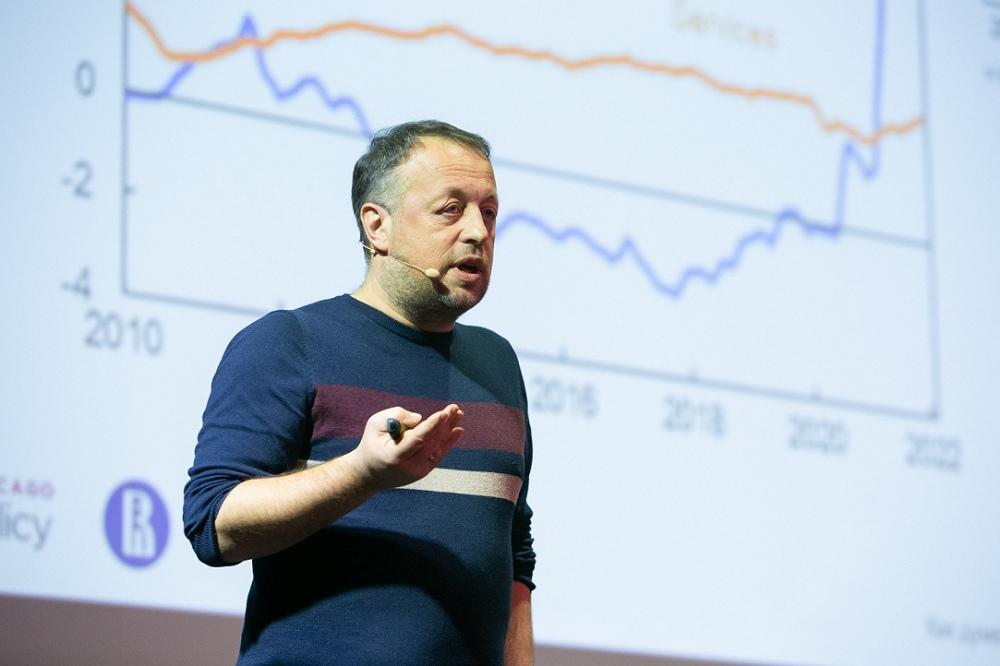Russian economy shifts to prospectless 'besieged fortress' model
Experts share their forecasts with Caliber.Az
INTERVIEWS 02 August 2022 - 17:14
| Huseyn Safarov Caliber.Az |
Since February this year, in response to Russia's invasion of Ukraine, the collective West has consistently imposed packages of sanctions against Russia. As of today, there are already seven of them. Export-import restrictions have barely touched only vital products - natural gas, pipeline oil, foodstuffs, grain, and some agricultural fertilizers. At the same time, half of the Russian Central Bank's reserves were frozen, and Russian banks themselves were disconnected from the SWIFT international payment system. Exports of Western technology, aviation equipment, electronics, and luxury goods to Russia were banned. In addition to the EU, sanctions against Russia were imposed by the United States, Canada, Japan, Switzerland and the United Kingdom. However, even after the unprecedented restrictions, Russia did not stop military actions in Ukraine.
So how effective are Western sanctions against Russia and can they eventually change the Kremlin's course? Caliber.Az asked this question to Yevsey Gurvich, head of the Russian Economic Expert Group, and Konstantin Sonin, an economics professor at the University of Chicago.

According to Gurvich, the losses of the Russian economy from the sanctions are still much smaller than predicted, but they cannot be called intangible.
"In June 2022 the output in the basic industries was 4.5% lower than in June last year. However, we should also take into account that this year's output is expected to grow by about 3%, so the losses should be assessed by comparing the fact with previous forecasts.
The Russian economy is really holding up well due to several factors: a) sanctions against Russian oil and gas exports have led to a sharp increase in their prices in world markets; b) many industries, which have lost sources of necessary imports, operate on existing reserves; c) previously established reserves and other mechanisms to protect the Russian economy from shocks (including the often criticized oil National Welfare Fund) have demonstrated that they are well protected not only from "natural" but also from "artificial" shocks, including the toughest sanctions.
But this does not mean that the sanctions (and the voluntary withdrawal of many foreign companies from Russia) will be painless for our economy at all. In fact, there is shifting to another model - from the trend of integrating the Russian economy into the world economy to the model of a "besieged fortress". And this model, as the world experience shows, has no prospects, it has not demonstrated success anywhere. That is, the current relatively successful adaptation to sanctions does not mean that they will not continue to have a serious impact on the Russian economy," Gurvich said.
A more negative picture of the Russian economy because of the sanctions was described by Professor Sonin from Chicago, who argues that the drop in living standards in Russia is already noticeable.

"There are fewer goods available. Food prices have risen sharply, so the population of the Russian Federation has had to cut back on many other things. You have to understand that the Russian economy is colossal. After the collapse of the Soviet Union in three decades the Russian economy became a large institutionalized market economy, and due to this, it has managed to cope with the shock. Besides, the Russian government has no merit in this. Even if there had been no government, the Russian economy would not have collapsed and stopped. The central bank, for example, did nothing to make people's lives easier," the economist explained.
At the same time, Sonin emphasized that Russia is a huge country, and therefore the atmosphere of peaceful life in the capital still remains.
"The Ukrainian war involves several hundred thousand people on both sides. For Russia, this is less than 1% of the population. I think it is the effect of the colossal size of Russia that sets the atmosphere of peaceful life in Moscow. Incidentally, during World War II, many cities beyond the Urals had a fairly peaceful life. The Russian Federation, with such a decline in living standards, could be at war for years, perhaps even ten years," noted our interlocutor.
Answering the question about the seemingly insufficient military support of Ukraine by the West, Sonin said that assistance is provided at the level Ukraine can accept it.
"I consider the opinion of some experts that the West will get tired of supporting Ukraine to be nonsense. Aid to Ukraine will only increase. The fact is that Kyiv now has the most powerful political ally around the world - the military-industrial complex. The West could have sent a lot more modern military equipment, but it needs trained people to use it, West does not want to send specialized equipment for people who do not understand it," the economist pointed out.
Sonin also touched upon the topic of Russian education in conditions of war and sanctions. The expert is sure that Russian President Vladimir Putin's invasion of Ukraine dealt a huge blow to science and education in the country.
"But even so, Russian education and science will not disappear completely. Every year the programs will begin to deteriorate, and there will be fewer of them, but it will still be massive for many years to come. I think that a huge blow will fall on the social sciences, this area has been developing in Russia for the last 30 years. In the 1990s, mathematics was dealt a terrible general economic blow, although no one set for themselves such a task. The same thing is happening now - no one sets out to destroy Russian mathematics, but the best Russian mathematical scientists are now in Tbilisi or in the Baltics. But Russian science is so great that even with this wave of emigration, someone will remain in Russia. Nevertheless, it is a blow and a great loss. If even for a year or two serious money will be allocated for education, then it will begin to decline sharply. With such a drop in GDP, even if it is not 50%, but only 10%, if it lasts a year, then there will be a drop, and another year later a drop, and that means budget sequestration will begin. Universities and science will be cut first, and only then will other areas be affected. Somewhere there will be a local improvement, but overall it is a very big loss," Sonin predicted.
Caliber.Az
|
1
|
"Macron has completely lost respect and is acting like a hysteric" Russian analysts on Caliber.Az
14 April 2024 - 16:45
|
|
2
|
Times: UK, Armenia hold talks on sending illegal migrants to Armenia
15 April 2024 - 10:00
|
|
3
|
"Historical" Armenia vs. present-day Armenia Unveiling the conundrum
15 April 2024 - 09:11
|
|
4
|
Caliber.Az to reveal sensational details of "Brussels meeting" Important announcement
16 April 2024 - 12:09
|
|
5
|
Iran calls attack on Israel "legitimate and justified act of self-defence"
14 April 2024 - 11:10
|
The Hill: Use Russian assets to rebuild Ukraine
17 April 2024 - 01:05
Three ways Israel could respond to Iran
Analysis by Foreign Policy16 April 2024 - 23:02
SCO chief calls on organization’s countries to develop intercultural dialogue
16 April 2024 - 21:09
Azerbaijan to build wind farm in Baku
16 April 2024 - 20:56
Putin hails Iran's "tactful" punishing of aggressor Israel
16 April 2024 - 20:43
China raps US obstruction of UNSC's action on Israeli crimes - Tasnim
16 April 2024 - 20:28
Minister: Azerbaijan’s renewables potential may quadruple by 2030
PHOTO16 April 2024 - 20:12
Google to spend $100 billion on AI development
16 April 2024 - 19:57
IMF improves forecasts for Azerbaijan’s economic growth in 2024
16 April 2024 - 19:40
Kazakhstan announces austerity measures to deal with floods
16 April 2024 - 19:23
Azerbaijan supplied over 6 million cubic metres of gas to Serbia
In two months16 April 2024 - 19:08
NASA completes analysis of recovered space object
16 April 2024 - 18:52
F-35s to cost $2 trillion as Pentagon plans longer use
16 April 2024 - 18:37
Resettlement draw: Over 150 Azerbaijani families await new homes in Fuzuli
PHOTO16 April 2024 - 18:20
Navigating complexity: the contradictory path of Nikol Pashinyan
16 April 2024 - 18:13
British households throw away some 1.7B pieces of plastic every week
16 April 2024 - 18:05
Azerbaijan slams Freedom House's pro-Armenian report
Challenges western-centric evaluations16 April 2024 - 18:00
China's president puts forth four principles to resolve Ukraine crisis
16 April 2024 - 17:51
US State Secretary disagrees with Russian president on allies in Black Sea
16 April 2024 - 17:36
Iran clarifies definition of extra-regional forces, identifies countries
16 April 2024 - 17:21
bp announces start-up of oil production from major new platform offshore Azerbaijan
16 April 2024 - 17:05
Is China experiencing an economic slowdown?
Global glut16 April 2024 - 17:00
Russia, Türkiye discuss various issues, including Black Sea
Kremlin spokesperson says16 April 2024 - 16:49
US to green-light new Iran sanctions after Israel attack
16 April 2024 - 16:32
Paris 2024 torch lit in ancient Olympia, relay under way
16 April 2024 - 16:16
Armenian Parliament speaker heads to Lithuania
16 April 2024 - 15:58
No country considers four villages as Armenian territory
Pundit highlights challenges in Gazakh district issue16 April 2024 - 15:41
Azerbaijan is like an island of stability
Amidst global turmoil16 April 2024 - 15:30
German chancellor says Russia's invasion of Ukraine threatens global security
16 April 2024 - 15:23
Memorandum of Understanding on establishing Türkiye-Azerbaijan University approved
16 April 2024 - 15:05
"Armenia is a pawn in the West's game"
Analysts' insights on Western policy in South Caucasus16 April 2024 - 14:57
Pro Armenian Senator’s wife had corrupt deal with COVID lab
16 April 2024 - 14:47
Energy expert assures COP29 great opportunity for global cooperation
16 April 2024 - 14:32
COP29 — demonstration of Azerbaijan's "green" vector
Caliber.Az review16 April 2024 - 14:25
Hydrogen production an element of strategic partnership between Baku, Brussels
Azerbaijani minister addresses summit in UAE16 April 2024 - 14:18
"We now have full possession of our water resources", President Aliyev says
At groundbreaking ceremony for Shirvan Canal reconstruction16 April 2024 - 14:15
China tells Iran cooperation will last after attack on Israel
16 April 2024 - 14:00
Western Azerbaijanis slam Lemkin Institute, label it “collection of scribblers'"
16 April 2024 - 13:41
Azerbaijan's Combined Arms Army carries out technical inspection of auto vehicles
PHOTO16 April 2024 - 13:24
EU stresses need for delimitation of Azerbaijan-Armenia border
16 April 2024 - 13:07
